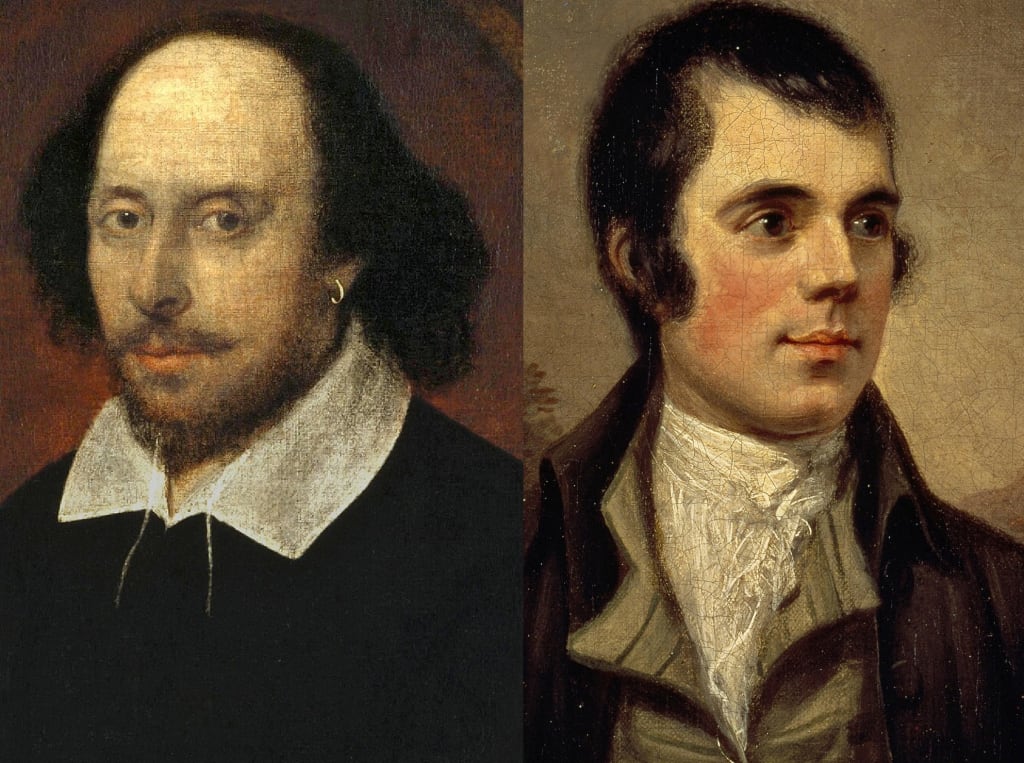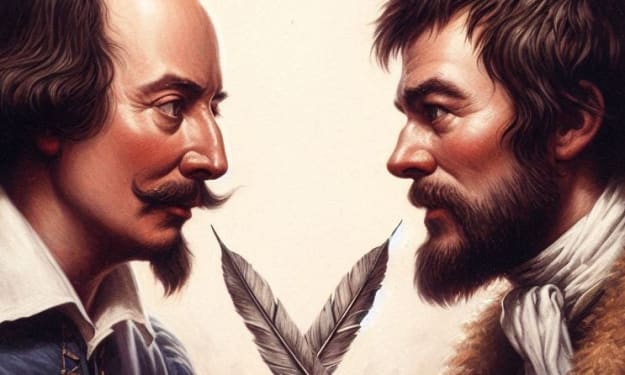If music be... study notes
Interpreting the Burns and Shakespeare interplay

Students of English literature, Scottish dialect or Gaelic language should recognise the quotes from Robert Burns and William Shakespeare in my wee poem If music be the feud. For anyone finding the language and allusions obscure, these notes should help.
Robert Burns
Robert Burns (1759 – 1796) aka Rabbie Burns, was a Scottish poet and lyricist. He is generally regarded as the national poet of Scotland and is celebrated worldwide.
William Shakespeare
William Shakespeare (1564 – 1616) was an English playwright, poet and actor. Widely regarded as the greatest writer in the English language. His plays have been translated into every major living language.
Shakepeare lived two centuries before Burns so, of course, they never met. The meeting in this poem is an allegory, a little story that pokes fun at both and suggests considerable rivalry.
Line by line
If Music be the Feud: complete and without notes
(1) If music be the food of love, play on.
Opening line of the play Twelfth Night, Shakespeare. The speaker, frustrated in courtship seeks love in abundance. The suggestion is that Shakespeare is musing on his own work, perhaps being arrogant.
So say thee, Shakespeare, England's favoured son.
A sneer at Shakespeare from Burns, reflecting the academic rivalry between followers of the two 'bards.' Burns is known to have been heavily influenced by the works of Shakespeare but there is evidence that the term 'bard' (poet) was used to refer to Scottish poets first. This, according to an academic at the University of St Andrews, Scotland, (which was attended by HRH The Prince of Wales and where he met Katherine, Princess of Wales). The theory is that only later did the term come to be used to refer to Shakespeare.
Ah Burns, dear fellow poet, you're well met.
A nod and greeting to Burns whom, apparently, Shakespeare has only just noticed.
Nay, Sassen: good will, never shall thee get.
No Sassenach (Englishman, literally 'saxon') I will not be your friend. We can only speculate at this snub to Shakespeare.
Why Rabbie, whither went thy auld lang syne?
Auld Lang Syne is the most famous work of Burns and is a song and poem about old friends who have not met since 'long, long ago'. Shakespeare is quoting his rival in order to bemoan the lack of recognition for an old friend. 'Wither' meaning: to what place?
Belay it beard, or hurley-burley shall be thine.
Burns quotes Shakespeare right back, parodying the irony with a double irony. From Macbeth (the 'Scottish Play' by Shakespeare)... "First Witch: When shall we three meet again. In thunder, lightning, or in rain? Second Witch: When the hurly-burly's done, When the battle's lost and won." Burns is offering a fight unless Shakespeare shuts up ('belay it' = stop it). He also deliberately insults his rival by calling him 'beard' rather than 'bard' as if a slip of the tongue.
Thou sayest freedom’s sword will strongly draw?
S again quotes B, this time Scots Wha Hae, a poem with a call to all Scotsman to unite in arms against the ruling English King Edward.
Aye! Fra Afon, fa Wallace, king and law.
Mixing in English, Danish-English-Scottish (Aye=yes), Welsh (Fra Afon = from the region of the river Avon - S was from Stratford-upon-Avon). B continues the poem Scots Wha Hae: "for Scotland's King and Law, Freedom's sword will strongly draw," which references William Wallace, who helped to unite the Scottish clans and defeat the English army. B is, in effect, declaring war on S.
Thou presseth me thou Caledonian cur.
S is saying that B goes too far, and insults him back by calling him at Scottish dog (cur).
For injuries thou doest, turn and draw.
In response to the insult (injuries) B demands that S stand and fight, quoting S, Romeo and Juliet: "Boy, this shall not excuse the injuries that thou hast done me; therefore turn and draw."
As you like it, so you will regret.
S quoting the title of his own comedy play, responds to Burns's challenge by agreeing to fight, but in a way that could be ironic or mocking, and in any case makes it clear that S has no doubt about his ability to defeat B in a fair fight. This might be considered a further arrogant claim by S to be the better poet.
Call here, I’ll unarm thee again, varlet.
More fighting talk, this time with B misquoting S, Troilus and Cressida, "Call here my varlet; I'll unarm again: Why should I war without the walls of Troy." Here, B turns the quote around from a refusal to fight, to a determination to respond to any move by S.
So set the teeth and stretch the nostril wide.
S quotes his play Henry V which gives a dramatic account of the unexpected victory of the English over the French at Agincourt (1415). By calling on his men to set their teeth and stretch their nostrils wide, The King is asking them to appear more fierce.
You, old man, best flee to save thy hide.
B, being the younger man, insults S further by referencing his age and telling S he had better run and save his skin.
Wha daur bring in a boy whose claims are wide.
S returns the age insult: Who dares (wha daur) bring in a boastful boy?
I wad be laith to rin an’ chase thee. Bide!
B, quoting his own poem, To a Mouse, "I don't want to run and chase you," so hang around and see what you get!
Wi’ murd’ring pattle? Thou say, verily?
S, sounding incredulous, asks B to confirm that he is truly threatening to strike S by continuing the line from To a Mouse: "I wad be laith to rin an’ chase thee Wi’ murd’ring pattle!" - The 'murdering' pattle is a wooden ploughman's implement that could be used as a striking weapon.
Come, dear friend, perhaps I spoke hasty.
At this point, B draws back from what could have become a nasty conflict and offers reconciliation.
And thee a wee cowrin, tim'rous beastie?
S responds with a witticism by quoting the first line of the poem and therefore comparing Burns, obviously in jest, to the mouse of the poem's title.
Ha! ha! You wag, forsooth you make me chortle.
B picks up on the joke and laughs, ribbing S in return, who does indeed make B chortle.
Let us embrace, then, sit and raise a bottle.
S invites B to share a drink
Indeed your English ale will slake a thirst.
Whatever B thinks about English poetry, he is more than happy to drink English ale with S
Then to it, bardic comradeship come first.
"Let's go ahead," says S to B, us poets ought to stick together.
We'll drink the night away then full day next.
Burns is happy to drink the night away and the rest of the next day
At length to cross the sword wi bladders vexed.
I will leave this allusion 'cross the sword', in the context of over-filled bladders, to the reader's imagination.
And there’s a hand, my trusty fere! And gie’s a hand o’ thine!
This and the following quote from Auld Lang Syne pledge friendship, with Burns first asking his trusty friend Shakespeare to shake hands.
And we’ll tak a right gude-willie waught, For auld lang syne.x
And we'll take a right good drink for old times.
I hope you enjoyed the happy ending to this anglo-scottish poetic rivalry, all in good fun, of course, and the best possible taste.
Thanks for reading
You might now like to reread my little poem, with the benefit of this translation. Enjoy!
Thanks for reading
Ray
About the Creator
Raymond G. Taylor
Author based in Kent, England. A writer of fictional short stories in a wide range of genres, he has been a non-fiction writer since the 1980s. Non-fiction subjects include art, history, technology, business, law, and the human condition.
Enjoyed the story? Support the Creator.
Subscribe for free to receive all their stories in your feed. You could also pledge your support or give them a one-off tip, letting them know you appreciate their work.






Comments (2)
I cannot say that I understood everything but the parts that I was able to, I found them very entertaining hehehehehe
This is quite the fun read to me. This would be good to read in a Creative writing course or even an English literature lecture.